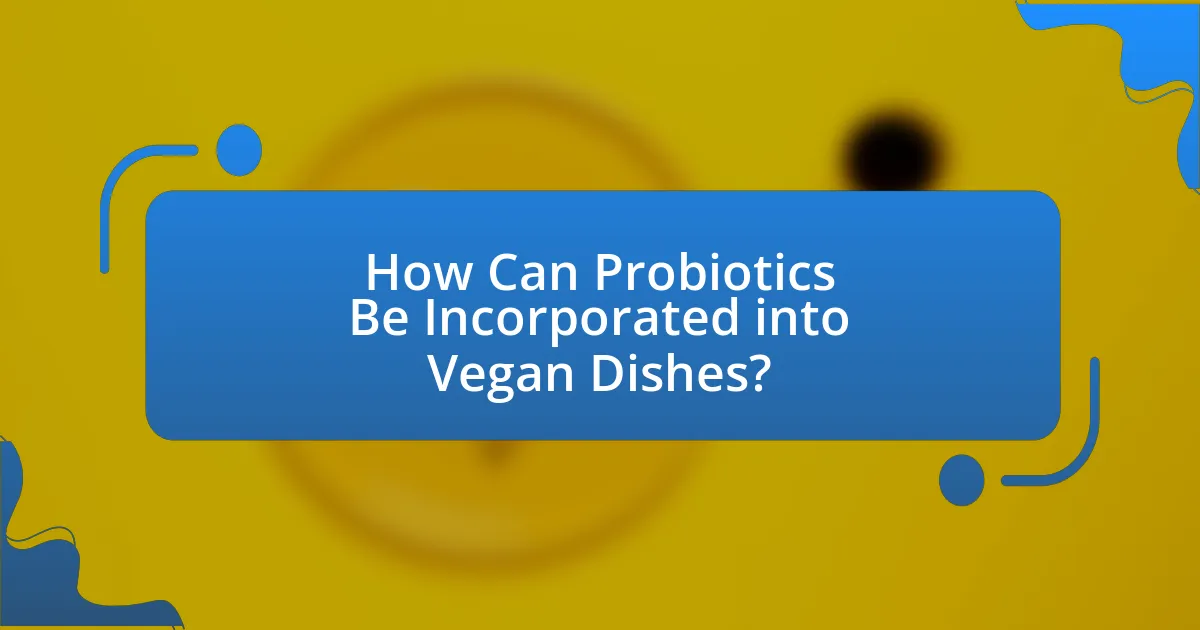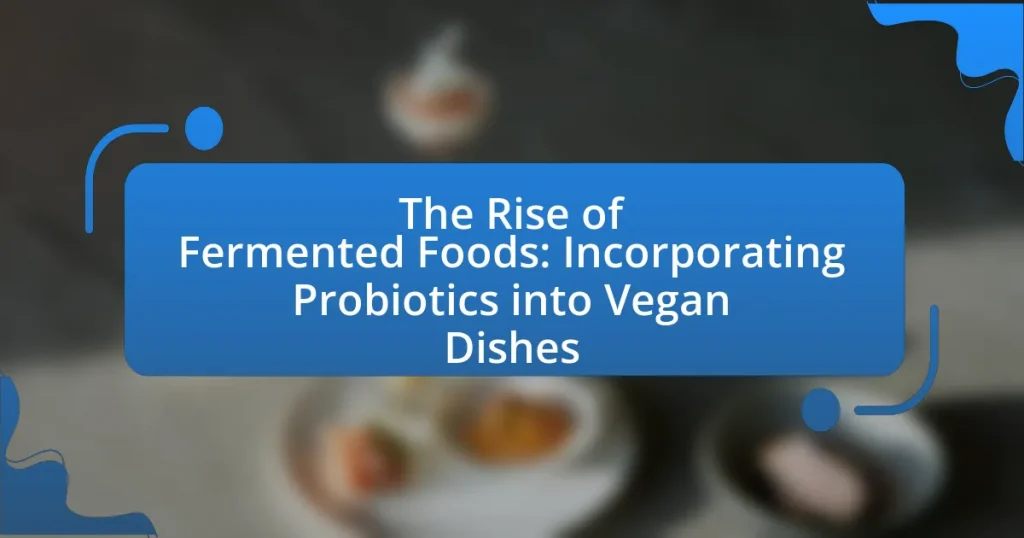Fermented foods, created through the fermentation process involving microorganisms, are gaining popularity due to their health benefits, particularly in promoting gut health through probiotics. This article explores how fermented foods enhance nutritional value and flavor, their role in vegan diets, and the key health benefits of probiotics. It also discusses practical methods for incorporating fermented foods into meals, the challenges faced in their use, and emerging trends in the market for vegan fermented products. By highlighting common fermented foods suitable for vegans and innovative production techniques, the article provides insights into the evolving landscape of fermented foods and their significance in promoting overall health and wellness.

What are Fermented Foods and Why are They Gaining Popularity?
Fermented foods are products created through the process of fermentation, where microorganisms such as bacteria, yeast, or molds convert sugars and starches into acids, gases, or alcohol. This process not only preserves the food but also enhances its nutritional value and flavor. The popularity of fermented foods is increasing due to their health benefits, particularly their role in gut health, as they are rich in probiotics, which are beneficial bacteria that support digestive health. According to a study published in the journal “Nutrients,” probiotics can improve gut microbiota balance and may reduce the risk of certain diseases. Additionally, the growing interest in plant-based diets has led to a rise in the incorporation of fermented foods into vegan dishes, making them appealing to a broader audience.
How do Fermented Foods Contribute to Health?
Fermented foods contribute to health by enhancing gut microbiota, which plays a crucial role in digestion and immune function. These foods, such as yogurt, kimchi, and sauerkraut, are rich in probiotics—beneficial bacteria that help maintain a balanced gut environment. Research indicates that a diverse gut microbiome is associated with improved metabolic health and reduced inflammation. For instance, a study published in the journal “Nature” found that individuals consuming fermented foods regularly had a higher diversity of gut bacteria, which is linked to better overall health outcomes. Additionally, fermented foods can improve nutrient absorption and may alleviate symptoms of lactose intolerance, further supporting digestive health.
What are the key health benefits of probiotics found in fermented foods?
Probiotics found in fermented foods offer several key health benefits, including improved gut health, enhanced immune function, and better digestion. These beneficial bacteria help balance the gut microbiome, which can lead to reduced symptoms of gastrointestinal disorders such as irritable bowel syndrome and diarrhea. Research indicates that probiotics can also strengthen the immune system by promoting the production of antibodies and enhancing the activity of immune cells. Additionally, studies have shown that probiotics can aid in the digestion of lactose, making fermented dairy products more tolerable for individuals with lactose intolerance.
How do fermented foods impact gut health?
Fermented foods positively impact gut health by enhancing the diversity and abundance of beneficial gut bacteria. These foods, such as yogurt, kimchi, and sauerkraut, contain probiotics, which are live microorganisms that confer health benefits when consumed in adequate amounts. Research indicates that probiotics can improve digestion, reduce symptoms of irritable bowel syndrome, and strengthen the gut barrier function. A study published in the journal “Nature Reviews Gastroenterology & Hepatology” found that regular consumption of fermented foods is associated with a more diverse gut microbiome, which is linked to better overall health outcomes.
What Role Do Fermented Foods Play in Vegan Diets?
Fermented foods play a crucial role in vegan diets by providing beneficial probiotics that support gut health. These foods, such as sauerkraut, kimchi, and tempeh, are rich in live bacteria that enhance digestion and improve nutrient absorption. Research indicates that probiotics can help maintain a balanced microbiome, which is essential for overall health, particularly in plant-based diets that may lack certain nutrients. For instance, a study published in the journal “Nutrients” highlights that fermented foods can increase the bioavailability of vitamins and minerals, making them more accessible to the body. Thus, incorporating fermented foods into vegan diets not only enhances flavor but also contributes significantly to nutritional well-being.
How can fermented foods enhance the nutritional profile of vegan dishes?
Fermented foods enhance the nutritional profile of vegan dishes by increasing the bioavailability of nutrients and introducing beneficial probiotics. These foods, such as kimchi, sauerkraut, and tempeh, undergo fermentation, which breaks down complex compounds, making vitamins and minerals more accessible for absorption. For instance, fermentation can increase the levels of B vitamins, such as B12, which is crucial for vegans, as it is primarily found in animal products. Additionally, the presence of probiotics in fermented foods supports gut health, which can improve digestion and nutrient absorption, further enhancing the overall nutritional value of vegan meals. Studies have shown that incorporating probiotics can lead to improved gut microbiota diversity, which is linked to better health outcomes.
What are some common fermented foods suitable for vegans?
Common fermented foods suitable for vegans include sauerkraut, kimchi, tempeh, miso, and kombucha. Sauerkraut and kimchi are made from fermented cabbage and vegetables, providing beneficial probiotics. Tempeh, a fermented soybean product, is rich in protein and nutrients. Miso, a fermented soybean paste, is often used in soups and dressings, while kombucha, a fermented tea, offers a refreshing probiotic drink option. These foods not only enhance flavor but also contribute to gut health, making them popular choices in vegan diets.

How Can Probiotics Be Incorporated into Vegan Dishes?
Probiotics can be incorporated into vegan dishes by using plant-based fermented foods such as sauerkraut, kimchi, tempeh, miso, and non-dairy yogurt. These foods naturally contain live cultures that promote gut health. For example, sauerkraut and kimchi are made through the fermentation of vegetables, which enhances their probiotic content. Tempeh, a fermented soybean product, not only provides probiotics but also serves as a protein source. Miso, a fermented soybean paste, can be used in soups and dressings to add flavor and beneficial bacteria. Non-dairy yogurts made from almond, coconut, or soy milk often contain added probiotics, making them suitable for vegan diets. Incorporating these ingredients into meals can effectively boost probiotic intake while adhering to a vegan lifestyle.
What are the Best Methods for Adding Probiotics to Vegan Recipes?
The best methods for adding probiotics to vegan recipes include using fermented foods, probiotic supplements, and specific plant-based ingredients. Fermented foods such as sauerkraut, kimchi, miso, and tempeh are rich in natural probiotics and can enhance the flavor and nutritional profile of vegan dishes. Probiotic supplements, available in powder or capsule form, can be added to smoothies, dressings, or baked goods to introduce beneficial bacteria. Additionally, ingredients like coconut yogurt or almond yogurt, which are often fortified with probiotics, can serve as bases for desserts or sauces, providing both creaminess and health benefits. These methods effectively incorporate probiotics into vegan recipes, promoting gut health and overall wellness.
How can you use fermented ingredients in cooking?
Fermented ingredients can be used in cooking to enhance flavor, improve digestion, and increase nutritional value. For example, incorporating ingredients like kimchi, sauerkraut, or miso into dishes can add depth and umami flavor while providing beneficial probiotics. Studies have shown that fermented foods can aid in gut health, as they contain live bacteria that promote a healthy microbiome. Additionally, using fermented ingredients in marinades, dressings, or as toppings can elevate the overall taste profile of vegan dishes, making them more satisfying and nutritious.
What are some easy vegan recipes that include probiotics?
Easy vegan recipes that include probiotics are fermented foods such as vegan yogurt, sauerkraut, and kimchi. Vegan yogurt can be made by fermenting plant-based milk with probiotic cultures, providing beneficial bacteria. Sauerkraut involves fermenting shredded cabbage with salt, which encourages the growth of probiotics. Kimchi, a traditional Korean dish, is made by fermenting vegetables like napa cabbage and radishes with spices and probiotic-rich ingredients. These recipes not only enhance gut health but also add unique flavors to meals.
What Challenges Might You Face When Incorporating Probiotics?
When incorporating probiotics, one may face challenges such as ensuring the viability of the probiotic strains during food preparation and storage. Probiotics are sensitive to heat, moisture, and oxygen, which can diminish their effectiveness; for instance, studies indicate that temperatures above 120°F can kill many probiotic bacteria. Additionally, selecting the right strains that survive the digestive process is crucial, as not all probiotics are equally effective in promoting gut health. Furthermore, individuals may experience digestive discomfort when first introducing probiotics, as the gut microbiome adjusts to the new bacteria.
How can you overcome common obstacles in using fermented foods?
To overcome common obstacles in using fermented foods, individuals can start by educating themselves about the fermentation process and its benefits, which can alleviate concerns about safety and preparation. Understanding that proper fermentation techniques, such as maintaining the right temperature and using clean equipment, can prevent spoilage and ensure the growth of beneficial bacteria is crucial. Additionally, gradually introducing fermented foods into the diet can help individuals adjust to new flavors and textures, making the transition smoother. Research indicates that incorporating small amounts of fermented foods, like sauerkraut or kimchi, can enhance gut health and overall well-being, thus reinforcing the value of these foods in a vegan diet.
What are the best practices for storing and using fermented foods?
The best practices for storing and using fermented foods include keeping them in airtight containers, storing them in a cool, dark place, and using clean utensils to avoid contamination. Airtight containers prevent exposure to air, which can spoil the food, while cool, dark storage slows down fermentation and preserves flavor. Using clean utensils minimizes the risk of introducing harmful bacteria, ensuring the safety and longevity of the fermented product. Research indicates that proper storage can extend the shelf life of fermented foods, maintaining their probiotic benefits and flavor integrity.

What are the Future Trends in Fermented Vegan Foods?
Future trends in fermented vegan foods include increased innovation in plant-based fermentation techniques, a growing focus on health benefits, and the rise of functional foods enriched with probiotics. The fermentation process is evolving to incorporate diverse ingredients such as legumes, grains, and vegetables, enhancing flavor and nutritional profiles. Research indicates that the global fermented foods market is projected to grow significantly, driven by consumer demand for gut health and wellness products. According to a report by Grand View Research, the global probiotic food and drinks market is expected to reach $77.09 billion by 2025, reflecting the increasing interest in fermented vegan options.
How is the Market for Fermented Vegan Foods Evolving?
The market for fermented vegan foods is rapidly evolving, driven by increasing consumer demand for plant-based diets and health benefits associated with probiotics. According to a report by Grand View Research, the global fermented foods market is projected to reach $1 trillion by 2027, with a significant portion attributed to vegan options. This growth is fueled by rising awareness of gut health and the nutritional advantages of fermented products, such as improved digestion and enhanced immune function. Additionally, innovative product development, including plant-based yogurts, cheeses, and beverages, is expanding the variety of offerings available to consumers, further propelling market growth.
What innovations are emerging in the production of vegan fermented foods?
Innovations in the production of vegan fermented foods include the use of novel fermentation techniques, such as precision fermentation, which allows for the creation of specific flavors and textures without animal-derived ingredients. Additionally, advancements in microbial strains are enhancing the probiotic profiles of these foods, improving health benefits and taste. For instance, companies are now utilizing engineered yeast and bacteria to produce plant-based dairy alternatives that closely mimic traditional dairy products, providing a more appealing option for consumers. These innovations are supported by research indicating that the global market for plant-based fermented foods is projected to grow significantly, reflecting increasing consumer demand for healthier and sustainable food options.
How are consumer preferences shaping the future of fermented foods?
Consumer preferences are significantly shaping the future of fermented foods by driving demand for healthier, plant-based options rich in probiotics. As consumers increasingly prioritize gut health and wellness, the market for fermented foods, particularly those that are vegan, is expanding rapidly. According to a report by Grand View Research, the global fermented foods market is projected to reach $700 billion by 2025, with a notable increase in plant-based fermented products. This shift is evidenced by the rise of products like vegan yogurt and kombucha, which cater to health-conscious consumers seeking alternatives to traditional dairy. Additionally, the trend towards sustainability and ethical eating is influencing manufacturers to innovate and create diverse, flavorful fermented options that align with consumer values.
What Practical Tips Can Help You Incorporate More Fermented Foods into Your Diet?
To incorporate more fermented foods into your diet, start by adding items like yogurt, kefir, sauerkraut, kimchi, and miso to your meals. These foods are rich in probiotics, which can enhance gut health. For instance, a study published in the journal “Nutrients” found that regular consumption of fermented foods can improve digestive health and boost the immune system. Gradually introduce these foods by mixing them into salads, smoothies, or as side dishes, ensuring a diverse intake of beneficial bacteria. Additionally, consider making your own fermented foods at home, such as pickles or kombucha, which allows for customization and freshness.


